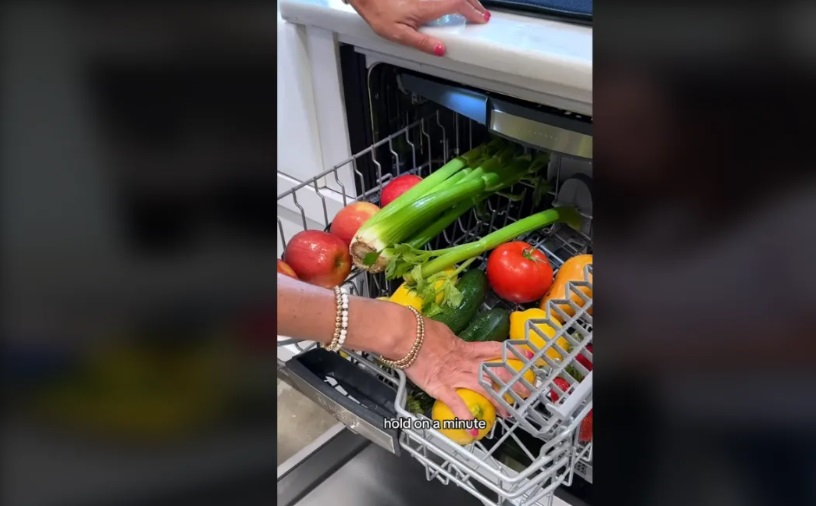
Videos of people washing their vegetables in the dishwasher have racked up hundreds of thousands - one even millions - of views on TikTok. But how far should we go in cleaning our produce and are we doing ourselves more harm than good?
Glenn Forsyth, who comes down from generations of growing potatoes, recalls his father's simple tips and tricks to get all sorts of produce clean... and none involved anything as abrasive as a dishwasher.
"It may sound silly, but some people do that and that's just - you just don't. I mean, there's no sort of discussion on that one. You see some videos where people are actually layering or putting down carrots and things in the dishwasher like they are knives and forks and, for goodness sake, you don't wash your fruit and vegetables in dishwashers."
Screenshot from video on TikTok of person washing fruit and vegetables in dishwasher. Photo: TikTok / allrecipes
Forsyth admits he might be a bit unique in some of his views, in that he likes to give his body some "roughage", even eating the skins of kiwifruit and crown pumpkin, saying he does not mind his body dealing with some germs.

"Very few foods are sterile, and they don't need to be sterile, because our bodies can handle microorganisms in the environment to a certain extent."
Supermarket vs markets vs from the tree
While washing produce was not necessarily critical, it can depend on where you source your produce, according to Prof Flint.
"For example, if you're buying it from a market like a farmers' market and they haven't been cleaned, you know, it may be advisable to wash them. Or if you're picking fruit off a tree, it may have bird shit on it, you'd want to wash that off.

There were other external factors to consider too.
"Harvesting lettuce from fields, the level of contamination can vary quite a lot depending on whether it's been raining or not," Prof Flint said.
New Zealand Food Safety said it had programmes in place to ensure chemical residues on fresh produce did not present a food safety risk, and growers followed Good Agricultural Practices to prevent and minimise contamination.
"Despite these measures, it is still good practice to wash and dry fresh fruit and vegetables before you eat them - especially if you are eating them raw. And of course, it is good practice if you use vegetables that are homegrown, or you don't know their source."
What about pre-packaged produce?
"The big danger with lettuces is if they are sold in plastic bags in the nice humid atmosphere inside there, which is going to encourage the growth of any residual bacteria that may be on the product and some of those bacteria may be pathogenic bacteria," Prof Flint said.
"So that's why the suppliers of lettuces in plastic bags normally take a great deal of care in washing and washing with sanitiser to keep that contamination to a minimum."
There are food safety requirements in place for growers of berries, leafy vegetables, melons and primary processors, by the Food Standards Australia and New Zealand.
What could happen if I don't?
One of the concerns is around contamination from the soil but generally, with things like potatoes, you would peel and cook them anyway, so there was less a risk that way, regardless of washing, Prof Flint said. Although it is unrealistic to think you'll get rid of all the microorganisms.
As the 'minister of fruit and vegetable', Forsyth encourages people to try and eat potatoes and kumara with the skins on, not only to improve digestion and "roughage". Instead of peeling, people could try to brush off the soil under a running tap of water, he said.
"Dad always used to tells us a lot of the nutrients et cetera sit just under the skin, so when peel that skin off with a peeler, it's gone, and he used to have this very good term, the best fed mouth in the household was the kitchen waste disposal unit."

"We very rarely have a problem and you can see that just by looking at, you know, the occasions when we have problems in the news media, I think the last one I was aware of was 2013 where we had listeria in lettuces.
"I mean, most people, myself included, don't wash my apples before I eat them, and I haven't got sick. So it's a matter of using your common sense, I think, and not being paranoid about it. But certainly, if people feel more comfortable about washing then there's no reason why not."
So then what is the best way to wash produce if I want to? Is water enough?
Water is okay and safe to use, but again there's "no real need" to do it if you can't see any possible contamination, Prof Flint said.
Some on social media have also been suggesting diluting vinegar with water to rinse their produce, which Prof Flint said had a better chance of reducing the contaminants but, again, it would not eliminate all microorganisms.
Is all produce washable?
Forsyth has a helpful system to sort out what to do with his produce: Is it a rinse, peel or rub one? He mostly defaults to cleaning them by gently running them under cool water from the tap.
One common debate is around whether mushrooms should be washed - but cooks have often advised against that, believing it takes on the water and ruins the best flavours of mushrooms. Some resort to lightly brushing off any residue with a paper towel, which reduces the chances of soil particles getting in your food.
In general, drying produce was advisable too, Prof Flint said.














